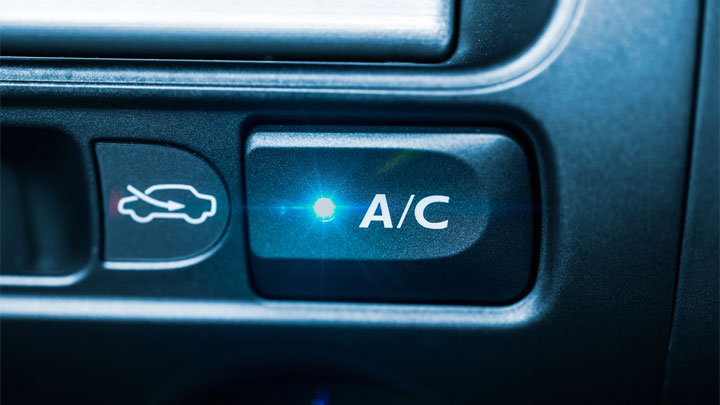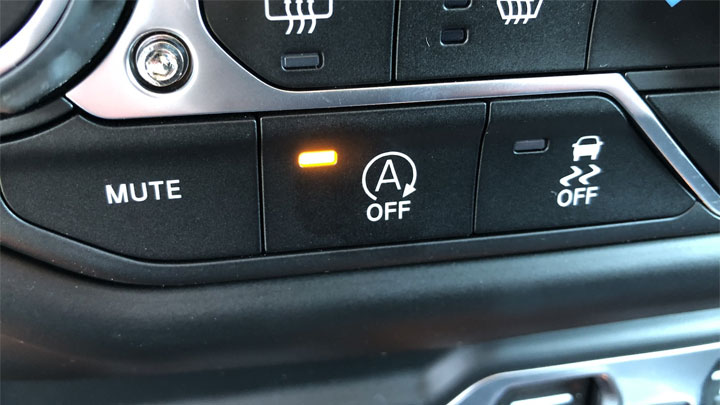Does Running Your Car A/C Use Gas?
Should I drive with the windows down or blast the air conditioning? Most people don’t think about it and just go about their daily drive, but chances are if you’ve found this article, you’re a bit of a thinker.
So, what’s more efficient? Driving with your A/C on or with the windows down? This article dives deep into the finer points of fuel efficiency in regards to air conditioning.

Related: How Much Gas Is Used When Idling?
Does Car A/C Use Gas or Electricity to Run?
Your car’s air conditioning system runs off of the serpentine belt in your engine bay. This means it is driven through power from your engine (gas).
As your engine cycles, the power moves through your serpentine belt, driving a pulley that runs your car’s A/C compressor.
You might notice that, when you are at a stoplight at idle, your engine’s RPM increases slightly when you have the A/C on than when you just have the windows down and A/C off. This is because the engine has to work a little bit harder to accommodate the increased load on your motor.
Related: 8 Reasons Your A/C is Not Blowing Cold Air
How Much Does A/C Use Affect Gas Mileage?

According to a 2004 SAE (Society for Automotive Engineers) study, they concluded:
They also go on to say that A/C use has a significant result on your fuel economy as you go faster, but so does the increased drag you get from having your windows down.
From what I gather, and this article from Advanced Auto Parts tends to agree, your fuel economy will generally be better if you drive with the windows down, if these are the only two factors that you are measuring.
The above article mentions that you can improve your fuel economy by up to 33% if you provide smooth accelerator input (not driving like an idiot) when you are going to and from the store, passing people on the highway, driving slow in the left lane, and in other driving situations.
The SAE also goes on to say that smaller passenger cars have a far better drag coefficient than your minivans and SUVs, so when you increase the drag by opening your windows to save fuel when driving a passenger car (let’s say a Toyota Camry), you are affecting the aerodynamics of that vehicle much more than if you did the same to a vehicle with an already-bricklike drag coefficient like my beloved Toyota Sequoia.
The same goes for if you were to blast the A/C on a car with a smaller motor, like a Honda Fit, compared to opening the windows to save fuel. When you run the A/C compressor connected to a smaller engine, it taxes that motor even more than when putting the same load on a larger engine.
See Also: 4 Signs Your A/C System Needs a Recharge
Air Conditioning vs Windows Down (for Fuel Efficiency)
When to Use the Air Conditioner

From what I’ve gathered, with a sedan (or similar), you should use the air conditioner when you are going faster than 68 mph (110 kph). With a sedan, this is the crossover point where the A/C draws less power than the gas mileage you would lose when rolling the windows down. Any speed under that, you might consider rolling the windows down instead of firing up the A/C.
When driving a larger vehicle like an SUV or pickup truck, you should run the A/C at speeds above 50 mph because the larger profile of that vehicle is affected more by cross winds as you speed up, which can reduce your miles per gallon.
If you decrease the aerodynamic efficiency of that vehicle further by rolling the windows down, you are just shooting yourself in the foot, proverbially.
See Also: Why Does My Car A/C Smell Bad?
When to Roll the Windows Down

You should roll the windows down when you are driving at speeds slower than 60 mph in a sedan/economy car and speeds slower than 50mph for trucks and SUVs from what I’ve collected.
If it’s just too hot outside and you just want to blast the A/C when going from stoplight to stoplight, your car will waste less gas than you would if you just had the windows down.
Please keep in mind that this will only result in something like 3-5% change in engine efficiency, whereas moderating your acceleration, braking, and general aggressiveness when driving can change your fuel consumption by as much as 33%.
We may be splitting hairs here, but keep that in mind.
Does A/C Reduce Horsepower?

The general consensus is that you’ll lose what amounts to 10 WHP (Wheel Horse Power) to each driven wheel when you run the A/C versus driving with the windows down (according to MotorBiscuit.com).
In most cars, you can definitely feel this when you’re driving up a hill and you turn the A/C on. You might notice you need to push the gas more to get up the same hill, in the same gear, with the same car than if you keep the A/C off.
Granted, at that point, you don’t really care about your fuel economy because you’re trying to pass that oblivious driver that’s just hanging out in the left lane!
Do Cars With an Auto Start/Stop Function Keep the A/C Running?

This comes down to the manufacturer at the end of the day, but in most cases, vehicles equipped with automatic start/stop technology (ie: the engine automatically shuts off while stopped at a red light and starts back up when you take your foot off the brake pedal) will not keep the A/C running.
As mentioned earlier, most A/C systems run off the serpentine belt in an engine so they would require the engine to actually be running. However, a few modern air conditioning compressors will run off of electricity to provide cold air for a short time without the engine running.
With Teslas and other electric vehicles where the A/C is 100% powered by electricity, you could theoretically leave the air conditioner running until the car battery is completely drained. This of course is determined by battery size and if the vehicle’s firmware places any limits on its use.
Should You Turn the A/C Off Before Turning Off Your Car?
It doesn’t matter whether you turn your A/C off before turning off your car. All that changes is the load on your engine when you have the car idling.
As the load on your engine increases with the A/C on, your car will burn more gas. If you turn off your A/C before you turn off your car, all you are doing is decreasing the load incrementally which may result in a slight bump in efficiency.
However, idling your car for just 10 seconds can have a pretty drastic effect on your car’s fuel economy so you won’t be seeing any difference at the fuel pump by changing how quickly you turn off your A/C when you’re about to turn off your car.
Conclusion
Remember, while you can see some fuel MPG efficiency increases by running your car with the windows down versus using the A/C at certain speeds, the savings will likely be negligible.
Changing your driving habits (ie: don’t ride your brakes), combining trips, adjusting routes to ones with less stoplights, and driving a more-efficient car (vs a sports car) will prove MUCH more impactful when it comes to your gas pump bottom line.
- How Long Does Paint Protection Film Really Last? - Apr 23, 2024
- How to Reduce Wind Noise in Your Car (Locate the Source) - Nov 22, 2023
- How Long Can You Drive on a Spare Tire? (and How Fast Can You Go?) - Sep 13, 2023

thank you
very helpful to a lot of people,
but common sense to me.
I was not sure about when to not run the ac unit. The mph helps.